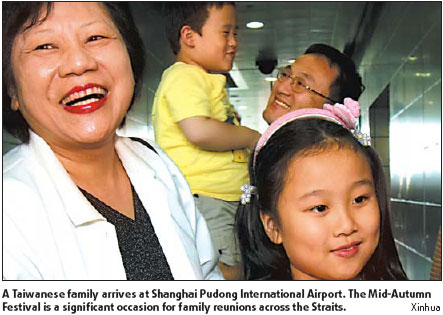Not all the festivities follow a Straits path to home
Lin Fengcheng has no special plan for the Mid-Autumn Festival. Unlike other Taiwan businessmen, who are busy arranging air-tickets back home for family reunions, the Beijing-based 34-year-old has buried himself in work. He had no idea of the actual date of the festival.
"The festival is just a matter of figures," the director of Tale Shape Visual Design Company comments, shrugging his shoulders. "For years, I have grown more rational. I have learnt to swallow the sadness and no longer get homesick. I won't particularly miss my family on that day."
Lin arrived in Shanghai in 2003. Two years later, he moved to the capital to start his own business. Although the lifestyle and working-pace in Beijing are different from Taiwan, he has decided to settle in the city, which offers a greater stage to show his talents. He returns to Taipei about three times a year, but only for businesses.

It is more economical to visit Taiwan during the low season because air-tickets are much cheaper. But Lin reveals a more important reason.
"Of course I am happy to see my family," he sighs. "I feel very stressed and even guilty in front of them because I have yet to achieve success. I'm just like a child who doesn't perform very well on his final examinations and finds it hard to face his parents." Lin doesn't know when fortune will shine his way but he does feel more determined to keep working as hard as he can, even on festive occasions.
Compared with Lin, Chen Chienming thinks he is much luckier.
The 29-year-old Taiwanese came to Shanghai in 2005 after falling in love with a woman from East China's Jiangxi Province during a cultural exchange program between Beijing and Taipei. They got married a few months ago.
"Those who are lonely and float overseas will be most afraid of the Mid-Autumn Festival. However, that is not my case any more," says the manager of Shanghai TK Life Website, which provides information for Taiwanese community living on the mainland.
"It's no difference for me to enjoy the festival either in Taipei or Shanghai, because I have close relatives on both sides. But I do miss the way people celebrate the festival in Taiwan," Chen says.
According to Chen, people in Taiwan are normally granted one or several days off to celebrate the festival.
What's more, the festival has developed into a barbecue occasion on the island over the past decade. Public parks, riversides and countryside areas are common places for activities. People eat roasted food, enjoy the full moon and the various fireworks.
Chen has invited his Taiwanese friends who work in Shanghai to attend a barbecue, which will be held the following weekend. He is really looking forward to the pre-Mid-Autumn Festival.
"The one thing that matters most in the festival is not about where you celebrate, it is about whom you spend it with," he says.
Hwang Yikung echoes Chen's sentiments.
The 62-year-old Taiwanese man is the first director to produce TV drama on the mainland in 1987, and the most recent TV series he directed is Madame Yu-Ching.
"I haven't returned to Taiwan for the Mid-Autumn Festival for five years," he admits. "In my opinion, people don't have to celebrate the festival always with their relatives. In fact, staying with friends is also a good choice. This is what I have had over the past few years."
Hwang denies feeling lonely when both his relatives and friends are not around on the festive occasion. "I will appreciate other people's reunion. I feel happy for them and in return their festive mood will influence me in a nice way," he adds.
According to recent statistics, more than 1 million Taiwanese business people live on the mainland, nearly one third of whom live in Dongguan, Southern China's Guangdong Province.
(China Daily 09/25/2007 page19)














